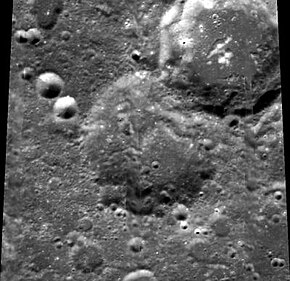
Clementine mosaic | |
| Coordinates | 53°36′N 127°36′W / 53.6°N 127.6°W |
|---|---|
| Diameter | 61 km |
| Depth | Unknown |
| Colongitude | 201° at sunrise |
| Eponym | Hendrik A. Kramers |

Kramers is an old lunar impact crater that is located on the northern hemisphere on the far side of the Moon. It lies some distance to the west of the larger crater Coulomb, and to the northwest of the smaller Weber, and it was named after Hendrik Anthony Kramers, a Dutch physicist. [1]
The outer rim of Kramers is heavily eroded and worn, although the perimeter of the original crater can be readily discerned. The younger, but comparably sized formation Kramers C intrudes into the northeast rim, and the two form a crater pair. The later crater has a terraced inner wall and a central peak at the midpoint.
Kramers lies within the Coulomb-Sarton Basin, a 530 km wide impact crater of Pre-Nectarian age.
Satellite craters
By convention these features are identified on lunar maps by placing the letter on the side of the crater midpoint that is closest to Kramers.
| Kramers | Latitude | Longitude | Diameter |
|---|---|---|---|
| C | 55.0° N | 125.6° W | 60 km |
| M | 50.4° N | 126.9° W | 30 km |
| S | 52.8° N | 132.2° W | 26 km |
| U | 54.2° N | 132.4° W | 38 km |
References
- Andersson, L. E.; Whitaker, E. A. (1982). NASA Catalogue of Lunar Nomenclature. NASA RP-1097.
- Blue, Jennifer (July 25, 2007). "Gazetteer of Planetary Nomenclature". USGS. Retrieved 2007-08-05.
- Bussey, B.; Spudis, P. (2004). The Clementine Atlas of the Moon. New York: Cambridge University Press. ISBN 978-0-521-81528-4.
- Cocks, Elijah E.; Cocks, Josiah C. (1995). Who's Who on the Moon: A Biographical Dictionary of Lunar Nomenclature. Tudor Publishers. ISBN 978-0-936389-27-1.
- McDowell, Jonathan (July 15, 2007). "Lunar Nomenclature". Jonathan's Space Report. Retrieved 2007-10-24.
- Menzel, D. H.; Minnaert, M.; Levin, B.; Dollfus, A.; Bell, B. (1971). "Report on Lunar Nomenclature by the Working Group of Commission 17 of the IAU". Space Science Reviews. 12 (2): 136–186. Bibcode: 1971SSRv...12..136M. doi: 10.1007/BF00171763. S2CID 122125855.
- Moore, Patrick (2001). On the Moon. Sterling Publishing Co. ISBN 978-0-304-35469-6.
- Price, Fred W. (1988). The Moon Observer's Handbook. Cambridge University Press. ISBN 978-0-521-33500-3.
- Rükl, Antonín (1990). Atlas of the Moon. Kalmbach Books. ISBN 978-0-913135-17-4.
- Webb, Rev. T. W. (1962). Celestial Objects for Common Telescopes (6th revised ed.). Dover. ISBN 978-0-486-20917-3.
- Whitaker, Ewen A. (1999). Mapping and Naming the Moon. Cambridge University Press. ISBN 978-0-521-62248-6.
- Wlasuk, Peter T. (2000). Observing the Moon. Springer. ISBN 978-1-85233-193-1.

Clementine mosaic | |
| Coordinates | 53°36′N 127°36′W / 53.6°N 127.6°W |
|---|---|
| Diameter | 61 km |
| Depth | Unknown |
| Colongitude | 201° at sunrise |
| Eponym | Hendrik A. Kramers |

Kramers is an old lunar impact crater that is located on the northern hemisphere on the far side of the Moon. It lies some distance to the west of the larger crater Coulomb, and to the northwest of the smaller Weber, and it was named after Hendrik Anthony Kramers, a Dutch physicist. [1]
The outer rim of Kramers is heavily eroded and worn, although the perimeter of the original crater can be readily discerned. The younger, but comparably sized formation Kramers C intrudes into the northeast rim, and the two form a crater pair. The later crater has a terraced inner wall and a central peak at the midpoint.
Kramers lies within the Coulomb-Sarton Basin, a 530 km wide impact crater of Pre-Nectarian age.
Satellite craters
By convention these features are identified on lunar maps by placing the letter on the side of the crater midpoint that is closest to Kramers.
| Kramers | Latitude | Longitude | Diameter |
|---|---|---|---|
| C | 55.0° N | 125.6° W | 60 km |
| M | 50.4° N | 126.9° W | 30 km |
| S | 52.8° N | 132.2° W | 26 km |
| U | 54.2° N | 132.4° W | 38 km |
References
- Andersson, L. E.; Whitaker, E. A. (1982). NASA Catalogue of Lunar Nomenclature. NASA RP-1097.
- Blue, Jennifer (July 25, 2007). "Gazetteer of Planetary Nomenclature". USGS. Retrieved 2007-08-05.
- Bussey, B.; Spudis, P. (2004). The Clementine Atlas of the Moon. New York: Cambridge University Press. ISBN 978-0-521-81528-4.
- Cocks, Elijah E.; Cocks, Josiah C. (1995). Who's Who on the Moon: A Biographical Dictionary of Lunar Nomenclature. Tudor Publishers. ISBN 978-0-936389-27-1.
- McDowell, Jonathan (July 15, 2007). "Lunar Nomenclature". Jonathan's Space Report. Retrieved 2007-10-24.
- Menzel, D. H.; Minnaert, M.; Levin, B.; Dollfus, A.; Bell, B. (1971). "Report on Lunar Nomenclature by the Working Group of Commission 17 of the IAU". Space Science Reviews. 12 (2): 136–186. Bibcode: 1971SSRv...12..136M. doi: 10.1007/BF00171763. S2CID 122125855.
- Moore, Patrick (2001). On the Moon. Sterling Publishing Co. ISBN 978-0-304-35469-6.
- Price, Fred W. (1988). The Moon Observer's Handbook. Cambridge University Press. ISBN 978-0-521-33500-3.
- Rükl, Antonín (1990). Atlas of the Moon. Kalmbach Books. ISBN 978-0-913135-17-4.
- Webb, Rev. T. W. (1962). Celestial Objects for Common Telescopes (6th revised ed.). Dover. ISBN 978-0-486-20917-3.
- Whitaker, Ewen A. (1999). Mapping and Naming the Moon. Cambridge University Press. ISBN 978-0-521-62248-6.
- Wlasuk, Peter T. (2000). Observing the Moon. Springer. ISBN 978-1-85233-193-1.